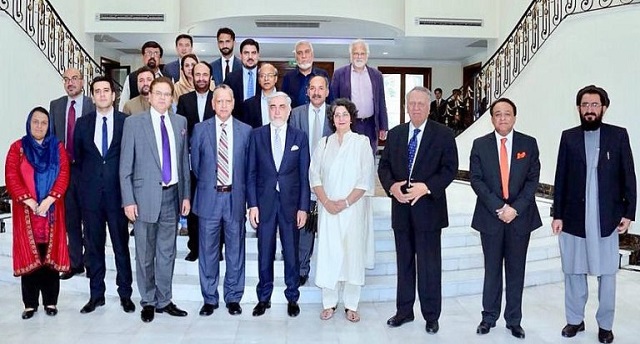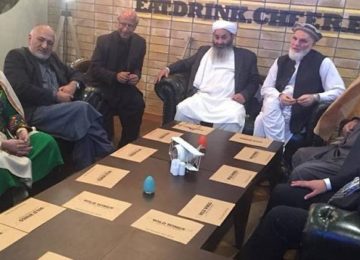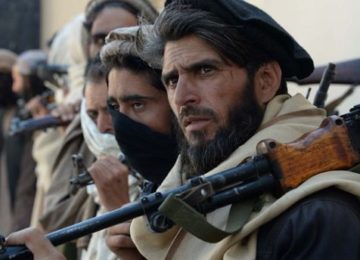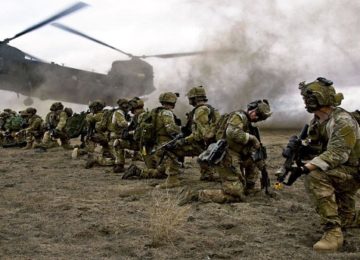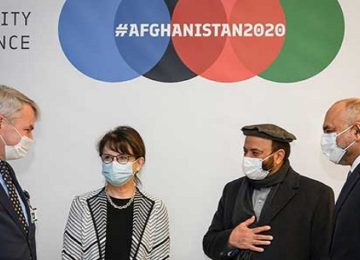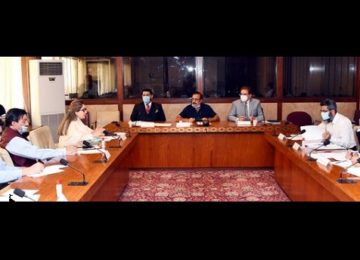A high level Pakistan delegation arrived in Kabul on Friday, June 22, 2018, for the third meeting of Pakistan Afghanistan Joint Committee (PAJC) as part of CRSS- SaferWorld- OESP Pak-Afghan track 1.5/II project Beyond Boundaries Phase III. The meeting was held in Kabul from June 22 – 26, 2018.
The Pakistani delegation was headed by Dr. Shoaib Suddle, Former IG Police and Federal Tax Ombudsman, while the other members included: Mr. Qazi Humayun, former Ambassador; Mr. Mohammad Sadiq, former Ambassador; Ms. Seema Ilahi Baloch, former Ambassador; Mr. Tahir Khan, senior journalist and Editor NNI, Mr. Rehman Azhar, senior journalist Express TV, and host of primetime TV talk show “Center Stage with Rehman Azhar”; Mr. Naveed Akbar, Senior Journalist and Foreign Affairs Correspondent Dunya Newspaper. The delegation was accompanied by Mr. Imtiaz Gul, Executive Director, CRSS, and Mr. Aized Ali, Project Director Beyond Boundaries, CRSS. Mr. Barnett Richard Rubin, International expert on Afghanistan and South Asia attended the PAJC bilateral dialogue meeting as International Neutral Expert and Chair.
The high level eight member Afghan PAJC delegation was headed by Mr. Abdul Hakeem Mujahid, Advisor and Member of Executive Board of the High Peace Council. Other members included: Mr. Khalid Pashtoon, Member of Parliament; Mr. Salim Khan Kunduzi, Former Governor Nangarhar and former Deputy Minister of Agriculture; Mr. Danish Karokhail, senior journalist and Head of Pajhwok News; Ms. Zakia Wardak, Civil society leader and entrepreneur; Mr. Khan Jan Alokozai, Co-President Pakistan-Afghanistan Joint Chamber of Commerce & Industry (PAJCCI); Mr. Mozammil Shinwari, Advisor to CEO on Trade and Economics; and Mr. Sayed Qutbuddin Roydar, former Deputy Minister for Parliamentary Affairs.
The Pakistan PAJC group held a meeting and briefing with Ambassador of Pakistan, Mr. Zahid Nasrullah Khan, at Embassy of Pakistan on June 22. The briefing was followed by a working dinner hosted by the Ambassador for Pakistan and Afghan PAJC groups. Mr. Anwar-ul-Haq Ahidi, former Finance and Commerce Minister, and former Governor State Bank of Afghanistan, was the Chief Guest. Other Afghan notable dignitaries included Members of Parliament (Wolesi Jirga), Mr. Abdul Qader Zazai, Ms. Elay Ershad, Ms. Rangina Kargar (all four are distinguished Members of Beyond Boundaries PAJC) and Mr. Shafique Hassan, Advisor to CEO on Youth Affairs.
Both the PAJC groups held a one day dialogue on June 24, at Serena hotel, Kabul. The bilateral PAJC dialogue included five sessions. In the first session, the PAJC members had interactive discussions on the review of policy recommendations of previous dialogues in Kabul and Islamabad; recap and review of recent positive bilateral developments including high level Pakistan and Afghanistan official’s visits; how to work jointly and build on the positives.
During the first session, Mr. Mozammil Shinwari, Advisor to CEO and Head of OESP said, “Let me first welcome both the delegations and brief you on the last two meetings in Kabul and Islamabad where we discussed a number of issues and came up with policy recommendations. In both meetings, the focus was on trade related issues, refugees, peace and security, and visa regime as well. Luckily, since our last two meetings, there were some significant improvements and positive developments at the bilateral level. First, if we look at trade, a high-level trade delegation from Kabul visited Islamabad for the first time in about a year and half for detailed discussions on problems being faced in bilateral and transit trade which brought some positivity to that process. Still, we are constantly lobbying and urging both governments that APTTCA meeting should be held as soon as possible. Some concrete decisions were made and we are hoping that other issues will also be resolved. We addressed some issues that Afghan traders were facing; for example, the regulatory duties issue was resolved during PM Abbasi’s visit when he made that announcement to waive off the regulatory duties.”

He further said, “Besides this, the issue of Afghan refugees is now a bit calm, and Pakistan government was so kind in that process that they accepted for voluntary return of Afghan refugees. There are several level of discussions on that including discussing the modalities in the refugees joint working group. On the visa regime also, there were some easements on visa regime by Pakistan government. They are now issuing Afghan businessmen multiple one year visas without reporting- this has been our constant demand in our joint groups recommendations as well as during meetings with Pakistan’s foreign office and embassy here, while some easement has been made on student and health visas too. We also discussed the visa issue with our foreign office and embassy in Islamabad, and they are now issuing six months multiple visas, as well as one year multiple visas for business community.”
He added, “On peace and security, there have also been significant developments through recent high level visits. Pakistan’s Prime Minister and COAS visited in June and from our side the NSA along with the Interior Minister and NDS chief twice visited Islamabad recently. Overall some positive movement from both sides has been observed and we welcome such political developments. It is heartening to see now that both governments are working closely under APAPPS. We do not claim that these developments have been based on our policy recommendations, but, certainly we proposed some measures through our recommendations and we are grateful that these proposals were considered by the two governments. Ultimately, the two governments are the decision makers, we can only lobby and share our work during the high level interactions with both the governments”.
In the second session, the PAJC members had an interactive discussion on the revival of formal contacts under the Afghan Pakistan Action Plan for Peace and Solidarity (APAPPS), a new mechanism for bilateral engagement through working groups/task forces; and peace & security. During this session, Dr. Shoaib Suddle, head of the Pakistan delegation, said: “we would like to thank our Afghan hosts and our counterpart group members for always welcoming us and being very positive during our discussions. We have talked about APAPPS as the most recent development. It is good that the two countries have agreed to sit down and talk about making a process of bilateral framework and mechanisms under APAPPS. At least a framework is developed and the next steps are underway. We cannot call it a success yet, but at least a positive process is been put in place. I think our side is very clear and we have been working hard towards this. We believe that peace in Afghanistan is critical for peace in Pakistan. The only solution is through sincere cooperation, and continuing to talk and meet at the bilateral level. Let’s hope APAPPS gets us out of the quagmire that we have been in for so many years historically, and can help build the required trust and confidence to work towards peace and reconciliation. We have to stop the blame game and move forward in the right direction.”
During this session, the PAJC groups held a meeting with Mr. Haroon Rashid Sherzad, Senior Advisor to the National Security Advisor Hanif Atmar, who briefed them on the framework of APAPPS.
In the third session, both PAJC groups discussed in detail the refugee issue; the latest on ground realities, bilateral and transit trade, the role of Pakistan and Afghanistan media in bilateral relations and addressing misperceptions through dissemination of positives instead of focusing on negatives only. During this session, the PAJC groups had a meeting with Mr. Khyber Farahi, Senior Advisor to President Ashraf Ghani on Migration and Social Development, who briefed them on the latest situation of Afghan refugees.
During the discussion on the role of media, the members reiterated the need to focus on media exchange programs, dramas and films to be dubbed in local languages and to be aired in both countries. The PAJC groups also discussed that if they can share the overall focus of this forum to expand and improve people to people contacts, as well as use social media as a forum to disseminate information to the youth of both countries, by creating a Facebook page of Beyond Boundaries.
In the fourth session, the groups discussed the way forward from the deliberations and debate around the focused themes of the dialogue, formulation of policy recommendations, while selected members, each from Pakistan and Afghanistan side, sat together to draft the recommendations.
 During this session, Mr. Abdul Hakeem Mujahid, head of Afghanistan delegation said: “I think this forum is a very focused forum; I can use for the forum the term ‘angels of peace’. This forum has been working very hard for creating trust and confidence building measures between the two countries by raising critically important issues between the two countries and the governments which is excellent work. I do appreciate that, and we will continue that.”
During this session, Mr. Abdul Hakeem Mujahid, head of Afghanistan delegation said: “I think this forum is a very focused forum; I can use for the forum the term ‘angels of peace’. This forum has been working very hard for creating trust and confidence building measures between the two countries by raising critically important issues between the two countries and the governments which is excellent work. I do appreciate that, and we will continue that.”
In the final and wrap-up session, the Chair Mr. Barnett Richard Rubin, read out the policy recommendations, which were approved and finalized by Pak and Afghan PAJC members.
Through the adopted policy recommendations, the PAJC groups unanimously supported, and welcomed the recent high level bilateral visits and the recently concluded APAPPS framework. The groups also welcomed commitment by both governments to refrain from public blame games as they pursue the new dialogue framework.
The PAJC groups agreed and urged the two governments to: i) Grant access to respective prisoners and sign an agreement on Mutual Consular Access, at the earliest; ii) Sign an agreement for repatriation of each other’s citizens and prisoners; iii) Dignified and honorable treatment to each other’s citizens at entry points; iv) Restrain official Spokespersons of the two governments from making knee jerk statements in situations involving the two countries. It was suggested that given the sensitivities, both sides should avoid instant reaction to any untoward incident; v) Work on a dignified and reasonable plan for Afghan refugees repatriation; vi) Hold APTTCA meeting at the earliest to improve the framework governing the transit trade; vii) Work towards ease-of-doing-business at international crossing points i.e. rationalizing regulations, procedures, as well as upgradation of physical infrastructure and services for traders, clearance mechanisms, and expansion of entry and exit points to facilitate the growing human and cargo traffic via the main crossing points; viii) Facilitate media interactions, exchanges; ix) Disseminate through media the progress being made under APAPPS; x) Help shape/correct negative narratives about each other; xi) Encourage and facilitate audio-video content exchange among public sector media organizations.
 As part of strategic sideline meetings with the Government of Afghanistan, on June 23, the Pakistan PAJC group held a meeting with Engineer Gulbuddin Hekmatyar, former PM, leader of opposition in the Wolesi Jirga, and head of Hizb-e-Islami. He welcomed the Beyond Boundaries Pakistani delegates and said: “We support the engagement between Pakistan and Afghanistan. Gap between Pakistan and Afghanistan will harm both countries. Continuation of war will badly affect people in both countries.” Hekmatyar recognised that Pakistan had suffered a lot because of the war in Afghanistan, by way of especially losing markets in Afghanistan. He said Pakistan was the only neighbor that suffered the most among Afghanistan’s neighbouring countries.
As part of strategic sideline meetings with the Government of Afghanistan, on June 23, the Pakistan PAJC group held a meeting with Engineer Gulbuddin Hekmatyar, former PM, leader of opposition in the Wolesi Jirga, and head of Hizb-e-Islami. He welcomed the Beyond Boundaries Pakistani delegates and said: “We support the engagement between Pakistan and Afghanistan. Gap between Pakistan and Afghanistan will harm both countries. Continuation of war will badly affect people in both countries.” Hekmatyar recognised that Pakistan had suffered a lot because of the war in Afghanistan, by way of especially losing markets in Afghanistan. He said Pakistan was the only neighbor that suffered the most among Afghanistan’s neighbouring countries.
 On June 24, the Pakistan and Afghan PAJC members held a meeting with the Chief Executive Officer (CEO) of Afghanistan, Dr. Abdullah Abdullah, at his office. Dr. Abdullah welcomed both delegations again, as this was the 4th meeting of Beyond Boundaries delegations with him since October 2015. He told the participants of his recent productive meetings with Pakistan’s Prime Minister (former) Shahid Khaqqan Abbasi, and COAS General Qamar Javed Bajwa. He said he is very optimistic this time as we are meeting in changed circumstances, apprising and welcoming the recent Afghanistan Pakistan Action Plan for Peace and Solidarity (APAPPS), and said hopefully this framework should be a start to a positive new beginning, “I am more hopeful this time that both sides should work on implementation of APAPPS”.
On June 24, the Pakistan and Afghan PAJC members held a meeting with the Chief Executive Officer (CEO) of Afghanistan, Dr. Abdullah Abdullah, at his office. Dr. Abdullah welcomed both delegations again, as this was the 4th meeting of Beyond Boundaries delegations with him since October 2015. He told the participants of his recent productive meetings with Pakistan’s Prime Minister (former) Shahid Khaqqan Abbasi, and COAS General Qamar Javed Bajwa. He said he is very optimistic this time as we are meeting in changed circumstances, apprising and welcoming the recent Afghanistan Pakistan Action Plan for Peace and Solidarity (APAPPS), and said hopefully this framework should be a start to a positive new beginning, “I am more hopeful this time that both sides should work on implementation of APAPPS”.
 On June 25, three members from Pakistan and Afghan PAJC groups visited Rana University, for interaction with youth and academia through lectures/ presentations by members from both the delegations; these university visits are part of the outreach to the youth of Afghanistan designed for the initiative to counter misperceptions about each other and improve their understanding on the Pak-Afghan bilateral relations (Full report in sideline meetings tab below).
On June 25, three members from Pakistan and Afghan PAJC groups visited Rana University, for interaction with youth and academia through lectures/ presentations by members from both the delegations; these university visits are part of the outreach to the youth of Afghanistan designed for the initiative to counter misperceptions about each other and improve their understanding on the Pak-Afghan bilateral relations (Full report in sideline meetings tab below).
Same day, both PAJC groups attended a working lunch with Afghan business leaders, hosted by Mr. Khan Jan Alokozai, Co- President PAJCCI and Mr. Yunus Momand, Vice President PAJCCI Afghanistan. The meeting was attended by other Afghan leading businessmen and Dr. Mohammad Yusuf Khan, Trade Minister Pakistan Embassy.
Distinguished members of Afghan PAJC Mr. Mirwais Yasini, Member of Parliament, and Ms. Elay Ershad, Member of Parliament, who could not attend the dialogue due to their prior commitments, hosted working dinners for both PAJC groups.
As part of the strategic communication through media dissemination, 3 members of Pakistan and Afghan PAJC participated at TV primetime talk shows at Khurshid TV, and Shamshad TV. Besides Afghan TV shows, Tolo TV, Mashal TV, and VoA (Pashto) covered the dialogue and visit proceedings.
This report is compiled by Mr. Aized Ali, Project Director, Beyond Boundaries – CRSS’ Pak-Afghan Track 1.5/II Initiative .
© Copyright Center for Research and Security Studies (CRSS) and Afghan Studies Center (ASC), Islamabad.



